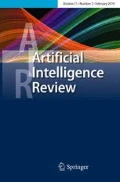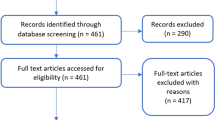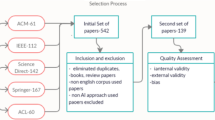Abstract
A learning style describes the attitudes and behaviors, which determine an individual’s preferred way of learning. Learning styles are particularly important in educational settings since they may help students and tutors become more self-aware of their strengths and weaknesses as learners. The traditional way to identify learning styles is using a test or questionnaire. Despite being reliable, these instruments present some problems that hinder the learning style identification. Some of these problems include students’ lack of motivation to fill out a questionnaire and lack of self-awareness of their learning preferences. Thus, over the last years, several approaches have been proposed for automatically detecting learning styles, which aim to solve these problems. In this work, we review and analyze current trends in the field of automatic detection of learning styles. We present the results of our analysis and discuss some limitations, implications and research gaps that can be helpful to researchers working in the field of learning styles.






Similar content being viewed by others
Notes
References
Ahmad NBH, Shamsuddin SM (2010) A comparative analysis of mining techniques for automatic detection of student’s learning style. In: Proceedings of the 2010 10th international conference on intelligent systems design and applications, ISDA’10, pp 877–882
Akbulut Y, Cardak CS (2012) Adaptive educational hypermedia accommodating learning styles: a content analysis of publications from 2000 to 2011. Comput Educ 58(2):835–842
Alkhuraiji S, Cheetham BMG, Bamasak O (2011) Dynamic adaptive mechanism in learning management system based on learning styles. In: 11th IEEE international conference on advanced learning technologies. IEEE Computer Society, pp 215–217
Biggs JB (1987) Student approaches to learning and studying. Research Monograph. Australian Council for Educational Research Ltd., Radford House, Frederick St., Hawthorn 3122, Australia
Bousbia N, Rebaï I, Labat JM, Balla A (2010) Analysing the relationship between learning styles and navigation behaviour in web-based educational system. Knowl Manag E Learn 2(4):400–421
Breiman L, Friedman J, Stone CJ, Olshen RA (1984) Classification and regression trees. Wadsworth International Group, Belmont, California
Brusilovsky P (1996) Methods and techniques of adaptive hypermedia. User Model User Adapt Interact 6(2–3):87–129
Brusilovsky P, Millán E (2007) User models for adaptive hypermedia and adaptive educational systems. In: Brusilovsky P, Kobsa A, Nejdl W (eds) The adaptive web, lecture notes in computer science, vol 4321. Springer, Berlin, pp 3–53
Carmona C, Castillo G, Millán E (2008) Designing a dynamic bayesian network for modeling students’ learning styles. In: ICALT, IEEE, pp 346–350
Carver CA Jr, Howard RA, Lane WD (1999) Enhancing student learning through hypermedia courseware and incorporation of student learning styles. IEEE Trans Educ 42(1):33–38
Cha HJ, Kim YS, Lee JH, Yoon TB (2006a) An adaptive learning system with learning style diagnosis based on interface behaviors. In: Workshop proceedings of internationl conference e-learning and games (edutainment)
Cha HJ, Kim YS, Park SH, Yoon TB, Jung YM, Lee JH (2006b) Learning styles diagnosis based on user interface behaviors for the customization of learning interfaces in an intelligent tutoring system. In: Ikeda M, Ashley KD, Chan TW (eds) Intelligent tutoring systems, lecture notes in computer science, vol 4053. Springer, New York, pp 513–524
Chang YC, Kao WY, Chu CP, Chiu CH (2009) A learning style classification mechanism for e-learning. Comput Educ 53(2):273–285
Charniak E (1991) Bayesian networks without tears. AI Mag 12(4):50–63
Coffield F, Moseley D, Hall E, Ecclestone K (2004) Should we be using learning styles? What research has to say to practice. Learning and Skills Research Centre, London
Crockett K, Latham A, Mclean D, Bandar Z, O’Shea J (2011) On predicting learning styles in conversational intelligent tutoring systems using fuzzy classification trees. In: IEEE international conference on fuzzy systems, pp 2481–2488
Deborah LJ, Baskaran R, Kannan A (2012), Learning styles assessment and theoretical origin in an e-learning scenario: a survey. Artif Intel Rev 1–19. doi:10.1007/s10462-012-9344-0
Dung PQ, Florea AM (2012) A literature-based method to automatically detect learning styles in learning management systems. In: Burdescu DD, Akerkar R, Badica C (eds) WIMS, ACM, p 46
Dunn R, Griggs S (2003) Synthesis of the Dunn and Dunn learning-style model research: who, what, when, where, and so what?. John’s University, St
Felder RM (1996) Matters of style. ASEE Prism 6(4):18–23
Felder RM (2010) Are learning styles invalid? (hint: No!). On Course Newsl
Felder RM, Silverman LK (1988) Learning and teaching styles in engineering education. Eng Educ 78(7):674
Felder RM, Soloman BA (1997) Index of learning styles questionnaire. URL http://www.engr.ncsu.edu/learningstyles/ilsweb.html
Felder RM, Spurlin JE (2005) Applications, reliability, and validity of the index of learning styles. Int J Eng Educ 21(1):103–112
García P, Amandi A, Schiaffino SN, Campo MR (2007) Evaluating bayesian networks’ precision for detecting students’ learning styles. Comput Educ 49(3):794–808
García P, Schiaffino SN, Amandi A (2008) An enhanced bayesian model to detect students learning styles in web-based courses. J Comput Assist Learn 24(4):305–315. doi:10.1111/j.1365-2729.2007.00262.x
Gardner H (1993) Frames of mind: the theory of multiple intelligences. Basic Books, New York
Georgiou D, Makry D (2004) A learner’s style and profile recognition via fuzzy cognitive map. In: Kinshuk, Looi CK, Sutinen E, Sampson DG, Aedo I, Uden L, Kähkönen E (eds) ICALT. IEEE Computer Society
Gilbert JE, Han CY (1999) Adapting instruction in search of ’a significant difference’. J Netw Comput Appl 22(3):149–160
Graf S (2007) Adaptivity in learning management systems focussing on learning styles. PhD thesis, Vienna University of Technology, 9801086 Neulinggasse 22/12A 1030 Vienna
Graf S, Kinshuk (2010) Using cognitive traits for improving the detection of learning styles. In: Proceedings of the 2010 workshops on database and expert systems applications, IEEE Computer Society, Washington, DC, DEXA ’10, pp 74–78. doi:10.1109/DEXA.2010.35
Graf S, Kinshuk, Liu TC (2008) Identifying learning styles in learning management systems by using indications from students’ behaviour. In: ICALT, IEEE, pp 482–486
Graf S, Kinshuk Liu TC (2009) Supporting teachers in identifying students’ learning styles in learning management systems: an automatic student modelling approach. Educ Technol Soc 12(4):3–14
Han J, Kamber M, Pei J (2006) Data mining: concepts and techniques. Morgan kaufmann, Burlington
Keefe JW (1979) Learning style: an overview. NASSP’s Student learning styles: diagnosing and proscribing programs. National Association of Secondary School Principles, Reston, VA, pp 1–17
Kelly D, Tangney B (2006) Adapting to intelligence profile in an adaptive educational system. Interact Comput 18(3):385–409
Kjærulff UB, Madsen AL (2008) Bayesian networks and influence diagrams: a guide to construction and analysis. Springer, New York
Kolb DA (1984) Experiential learning: experience as the source of learning and development. Prentice Hall, Englewood Cliffs
Kolekar SV, Sanjeevi SG, Bormane DS (2010) Learning style recognition using artificial neural network for adaptive user interface in e-learning. In: Computational intelligence and computing research (ICCIC), 2010 IEEE international conference on, pp 1–5. doi:10.1109/ICCIC.2010.5705768
Latham A, Crockett KA, McLean D, Edmonds B (2012) A conversational intelligent tutoring system to automatically predict learning styles. Comput Educ 59(1):95–109
Lo JJ, Shu PC (2005) Identification of learning styles online by observing learners’ browsing behaviour through a neural network. Br J Educ Technol 36(1):43–55
Popescu E (2009) Diagnosing students’ learning style in an educational hypermedia system. Cogn Emot Process Web Based Educ Integr Hum Factors Personal 1:187–208
Riding R, Rayner S (1998) Cognitive styles and learning strategies: understanding style differences in learning and behaviour. D. Fulton Publishers, United Kingdom
Sanders DA, Bergasa-Suso J (2010) Inferring learning style from the way students interact with a computer user interface and the WWW. IEEE Trans Educ 53(4):613–620
Sangineto E, Capuano N, Gaeta M, Micarelli A (2008) Adaptive course generation through learning styles representation. Univers Access Inform Soc 7(1–2):1–23
Schiaffino SN, Amandi A (2009) Intelligent user profiling. In: Bramer M (ed) Artificial Intelligence: an international perspective, lecture notes in computer science, vol 5640, Springer, New York, pp 193–216
Stash N, Cristea A, Bra PD (2006) Adaptation to learning styles in e-learning: approach evaluation. World conference on e-learning in corporate, government, healthcare, and higher education AACE Press, pp 284–291
Stathacopoulou R, Magoulas GD, Grigoriadou M, Samarakou M (2005) Neuro-fuzzy knowledge processing in intelligent learning environments for improved student diagnosis. Inf Sci 170(2–4):273–307
Symeonidis AL (2005) Agent intelligence through data mining, vol 14. Springer, New York
Villaverde JE, Godoy D, Amandi A (2006) Learning styles’ recognition in e-learning environments with feed-forward neural networks. J Comput Assist Learn 22(3):197–206
Witkin HA, Moore CA, Goodenough DR, Cox PW (1977) Field-dependent and field-independent cognitive styles and their educational implications. Rev Educ Res 47(1):1–64
Witten IH, Frank E (2005) Data mining: practical machine learning tools and techniques. Morgan Kaufmann, San Francisco
Yannibelli V, Godoy D, Amandi A (2006) A genetic algorithm approach to recognise students’ learning styles. Interact Learn Environ 14(1):55–78
Zatarain-Cabada R, Barrón-Estrada ML, Zatarain-Cabada R, García CAR (2009) A fuzzy-neural network for classifying learning styles in a web 2.0 and mobile learning environment. In: Chávez E, Furtado E, Morán AL (eds) LA-WEB/CLIHC, IEEE Computer Society, pp 177–182
Zatarain-Cabada R, Barrón-Estrada ML, Angulo VP, García AJ, García CAR (2010a) Identification of felder-silverman learning styles with a supervised neural network. In: Huang DS, Zhang X, García CAR, 0006 LZ (eds) ICIC (2), lecture notes in computer science, vol 6216, Springer, New York, pp 479–486
Zatarain-Cabada R, Barrón-Estrada ML, Angulo VP, García AJ, García CAR (2010b) A learning social network with recognition of learning styles using neural networks. In: Trinidad JFM, Carrasco-Ochoa JA, Kittler J (eds) MCPR, lecture notes in computer science, vol 6256, Springer, New York, pp 199–209
Özpolat E, Akar GB (2009) Automatic detection of learning styles for an e-learning system. Comput Educ 53(2):355–367. doi:10.1016/j.compedu.2009.02.018
Author information
Authors and Affiliations
Corresponding author
Rights and permissions
About this article
Cite this article
Feldman, J., Monteserin, A. & Amandi, A. Automatic detection of learning styles: state of the art. Artif Intell Rev 44, 157–186 (2015). https://doi.org/10.1007/s10462-014-9422-6
Published:
Issue Date:
DOI: https://doi.org/10.1007/s10462-014-9422-6




